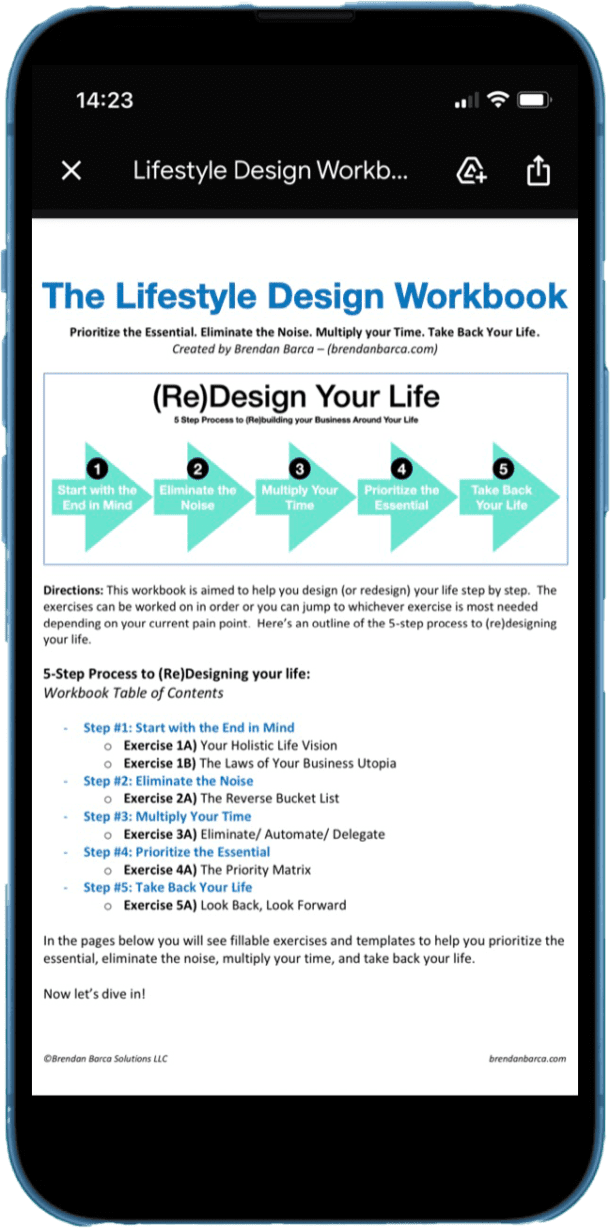
The job hunt can be a grind, but I think I found a way to help ease your pain. Over the past year as I explored various career paths and eventually landed my ideal job, I also became a master at the informational interview in the process. By the end of my job search I had it down to a science.
I developed a system that allowed me to conduct a successful informational call regardless of the industry or level of executive. The pre-call preparation system I came up with gave me confidence as I began each call and produced results by the end of it.
Not only did I land the perfect job in a completely new industry with the help of this system, but I was also was able to build a network of powerful connections hat I still hold today.
Below I’ve outlined my exact pre-call process.
I have also created an “Informational Interview Playbook” which serves as your template for mastering your own informational calls.
Want the Playbook? Fill in your information below and I’ll send it to you right now for FREE!
My Informational Interview Preparation System:
Step 1: Establish Goal of the Call:
It’s imperative for you to formulate a clear goal for your call before anything else. This goal will guide you both in your preparation and with the call itself. An informational call without a goal simply becomes a conversation, which is a huge mistake.
Questions to help you establish your goal:
- Why are you having this call in the first place?
- What would make this a successful call?
- What do you want to learn from this person?
- What do you want the person to learn about you?
- How do you want to end the call?
Note: After answering these questions, come up with your goal(s) and put it at the top of your in-call notes page so you can remind yourself of it throughout the call. This will help you keep the call on track and get the most out of it for both parties.
Step 2: Do Pre-Call Research on the Person:
Before jumping on the call, do your best to find out as much as possible about the person. If someone else set up the call for you, ask that person to give you a rundown on who you’ll be speaking with. Additionally, you should use Google, LinkedIn or their website to get a better understanding of the person. This will help the flow of the conversation and show the other person that you took the time to do your research.
The idea here is to weave in whatever knowledge you come up with into part of the discussion! The best things to bring up are areas of commonalities or anything you find that makes you genuinely curious about the person.
Research questions to consider:
- What is the their current position?
- What were their previous positions and industries?
- Where did they go to college?
- What activities or groups is the person involved with on LinkedIn?
- Who are your mutual connections on LinkedIn?
- What comes up when you Google the person’s name?
- How can you relate to the person? Is there any crossover you can bring up for the call?
Note: As you bring up these things on your call it’s OK to let the person know you found the information on LinkedIn or on their website! It will show you did your homework and will do nothing but impress the other person.
Step 3: Prepare your Verbal Agenda:
On an informational phone call there is likely to be no formalized agenda but it’s still important for you to have an agenda that you can verbalize towards the beginning of the call (remember, you are in control!). This agenda will give the person a clear understanding of what to expect and help you to keep the conversation on track so you can hit on all of your main points.
A typical informational call agenda should consist of three parts:
- Tell them about your professional background and what’s led you to this point
- Ask them about their career path and the position they’re in right now
- Gather advice from them that could help your current situation (opportunities or connections)
Note: Announce your agenda directly after the initial small talk ends (about 5 minutes into call). And then, after going over your loose agenda it’s also a good idea to ask how much time you have for the call. This will show your respectful and give you an idea of how to move through your conversation.
Step 4: Formulate Specific Questions:
In every informational interview you conduct remember that you are the one in control. You’re the one who set the meeting and therefore you are expected to direct the conversation. This can be very powerful as long as you’re prepared.
For each call you conduct you’ll want to have a plethora of questions at your disposal so you don’t run out. I also recommend categorizing each question within your projected agenda so that you know when to ask what.
Examples of Question Categories:
- Career/ background questions
- Industry questions (if different than yours)
- Questions about their specific company/ positions within it
- Closing questions/ high priority questions
Note: Make sure you prioritize your questions so that you get to the most important ones before time runs out! Also, I will be releasing a post soon that gives you the top questions that have worked for me in the past!
Step 5: Be Ready to tell “Your Story”
A portion of every informational call will revolve around you and your story. Make sure that your own story is crystal clear. You will be expected to give a brief overview of your career up to this point, where you see yourself going and what you’re looking for now.
This part of your preparation is critical as the only way people will be able to help you is if they fully understand who you are and what you’re looking for!
How to prep for your your story:
- Create 1-2 minute recap of your career progression to this point (not too long!)
- Clearly clarify major shifts in career/ transitional periods
- Ready a short list of the skills you have and the activities in your career you’ve enjoyed
- Have an explanation as to why you set up the call and why you’re looking for something new (be honest!)
Note: The key with “your story” is to be as true to yourself and what you want as possible. This is your chance to get your message out there and you have someone who is ready to listen. It’s from your story where people can relate to you and possibly find a way to help.
Step 6: Get Your Action Step Down (this is critical!):
We’ve all been at that awkward point in a conversation when time is running out and you’re really not sure how to wrap things up. The reason this happens is because you don’t have a plan! You need to have a plan.
As part of your pre-call prep make sure that you define a clear action step that stems from the goal of your call. What is it that you were hoping this call would accomplish? Although it won’t end in an immediate job, there are still good ways to move the needle forward.
Action steps for different situations:
Situation #1: There is a position at their company that matches your interests.
- Ask them who would be a good person to speak with next. As long as they’re in a position to do so, the person will almost always pass you through.
Situation #2: There is no immediate position but potential for the future.
- Ask them what the best way to stay on their radar would be. Are there others you should meet with? When is a good time to circle back?
Situation #3: There is no position or interest in their company.
- Ask them if there is anyone else in their network that they think you should speak with. If you conduct a good enough call the person will be more than happy to leverage their connections. People like feeling connected.
Note: The bottom line is that you NEED an action step. You need this call to be worth your time. You didn’t set this up to chit-chat, but to advance your career. Don’t be afraid to ask for something. The more you do it, the more you’ll see that people love to help you out!
Next Steps: Making Your Job Hunt Easier
That concludes my advice for the informational interview pre-call preparation. While this might seem like a lot, just know that the more preparation you do beforehand the more successful your call will be. On top of this, the more calls you do, the more natural this type of preparation will become.
As I mentioned at the top, I have also created an “Informational Interview Playbook” which serves as your template for mastering your own informational calls.
Want the “Informational Interview Playbook”? Fill in your information below and I’ll send it to you right now for FREE!





